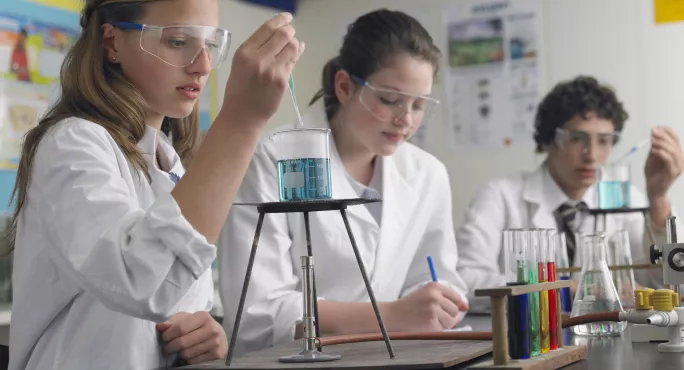- Home
- GCSE science grades will be hit by Covid, say teachers
GCSE science grades will be hit by Covid, say teachers

More than 60 per cent of teachers feel that a reduction in practical work owing to coronavirus restrictions will have a negative impact on exam attainment for 14 to 16 and post-16 pupils.
The Covid crisis has hit the practical side of science education quite heavily and will further affect it in the next academic year, according to a survey by the Association for Science Education.
Many science leaders and teachers participating in the survey said they are not prioritising science practical work over the coming year, while a third said they are not planning for any fieldwork or outdoor science activity.
International rankings: Focus on Pisa ‘has damaged science curriculum’
Comment: Could coronavirus change science education?
Testing: Ofsted links weak science scores to lack of KS2 testing
Over 60 per cent of the respondents to the ASE survey (science leaders and teachers) said they will focus on teaching content and will minimise practical work over the next academic year.
Coronavirus: The impact on science practical work
Over 30 per cent of respondents are not planning for fieldwork and outdoor science work in the next academic year.
Exams are a concern for science educators, according to to the survey.
While nearly 90 per cent of respondents were concerned about the lack of certainty around 2021 exams (14 to 16 and post 16), schools and colleges are anticipating a sharp reduction in the frequency of practical science taught from September to all age groups.
The ASE survey shows there is likely to be at least 20 per cent of GSCE and A-level classes experiencing no practical science at all.
Almost two in three teachers surveyed said that the lack of practical science work will have a negative impact on next year’s GCSE and A-level exams.
Hannah Russell, ASE chief executive officer, told Tes that a lack of practical science work will have a negative impact on science education at school.
She said: “We certainly anticipate that any lack of practical work will impact negatively on students’ experience and learning of science (especially around conceptual understanding), as well as their preparedness for future education and careers, not just for those going into Stem.
“Of course, we realise that the impact of Covid-19 will make it more difficult for students to carry out frequent and varied hands-on practical science. During this period, we would, therefore, also encourage schools and colleges to consider the value of teacher demonstration with high-quality student interaction.”
Ms Russell explained that recent findings from the Practical Assessment in School Science (PASS) project, run by the University of York and King’s College London, have shown that experiencing a teacher demonstration of an experiment led to significantly higher scores in practically-orientated GCSE questions than reading about the experiment or watching a video.
She added: “Of course, leading demonstrations such as this will rely on support and guidance to help teachers manage practical science in these new circumstances and we certainly see this as a key role for the ASE over the next few months.”
Ahead of full school reopening, science educators expressed a number of concerns. Issues around social distancing and adequate PPE were highlighted by 92 per cent and 81 per cent of respondents respectively, while 90 per cent said they were worried about pressure to catch up on missed content.
Almost 60 per cent of science leaders and teachers said they were not satisfied with their school or college provision for practical work during lockdown, and only 25 per cent set fieldwork or citizen science activities during the lockdown period.
Of the technicians responding to the survey, 80 per cent had some concerns over an increased workload or changes to working practices and 25 per cent of technicians anticipate that their workload will not be manageable within their normal hours.
The report adds that approximately 25 per cent of technicians who responded to the survey have been furloughed (from their independent school roles) and, anecdotally, some technicians are fearful of redundancy.
The ASE survey was conducted in the final weeks of summer term and just under 900 teachers, leaders and technicians took part.
Keep reading for just £1 per month
You've reached your limit of free articles this month. Subscribe for £1 per month for three months and get:
- Unlimited access to all Tes magazine content
- Exclusive subscriber-only stories
- Award-winning email newsletters



